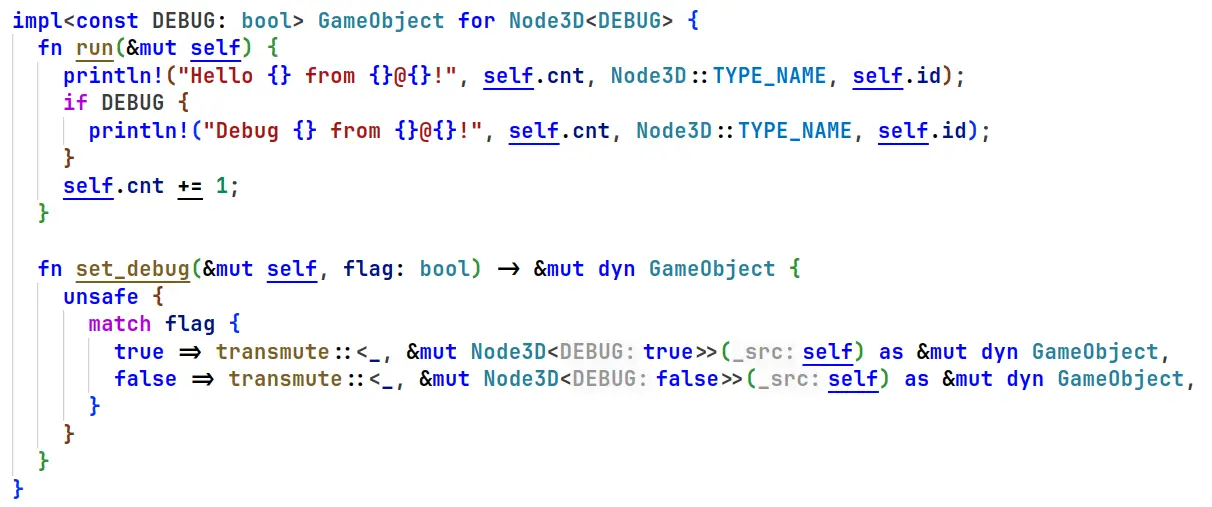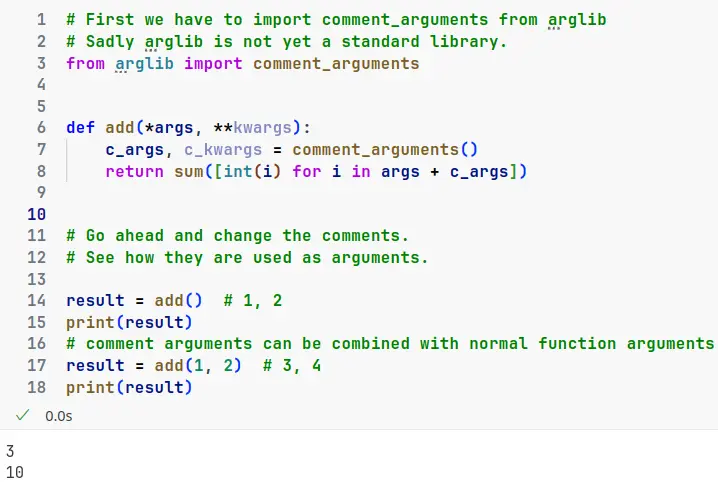People can change in drastic ways for unpredictable reasons. At any time.
Fully shared finances can screw you over real bad. Have shared accounts but keep a private one too.
Very similar to this tedx talk: https://youtu.be/8S0FDjFBj8o 😂
My favorite Ted talk is a Tedx talk. It has has helped me and past classmates quite a lot. I still rewatch it before giving presentations.
The quality of the content sadly often matters very little in comparison to the manner of speaking and self presentation.
I thought about all these points too. I agree. It's really not worth doing.
It is only benefitial at all, if dynamic dispatch is already in use. Then this "feature" is free besides the binary size.
I mostly thought about the code not slowing down the usual path and still retaining the option to change it at runtime.
Thanks for the detailed outline though.
Nothing is wrong with the logging crates. :)
I thought more about putting debug visualizations in the debug blocks - not log statements.
Well I did not think of that. So in the into_debug I would move all struct members from Foo<false> into a "new" Foo<true> and return that?
Runtime Const Generics


Hello,
I was playing around with rust and wondered if I could use const generics for toggling debug code on and off to avoid any runtime cost while still being able to toggle the DEBUG flag during runtime. I came up with a nifty solution that requires a single dynamic dispatch which many programs have anyways. It works by rewriting the vtable. It's a zero cost bool!
Is this technique worth it?
Probably not.
It's funny though.
Repo: https://github.com/raldone01/runtime_const_generics_rs/tree/v1.0.0
Full source code below:
```rust use std::mem::transmute; use std::sync::atomic::AtomicU32; use std::sync::atomic::Ordering;
use replace_with::replace_with_or_abort;
trait GameObject { fn run(&mut self); fn set_debug(&mut self, flag: bool) -> &mut dyn GameObject; }
trait GameObjectBoxExt { fn set_debug(self: Box<Self>, flag: bool) -> Box<dyn GameObject>; }
impl GameObjectBoxExt for dyn GameObject { fn set_debug(self: Box<Self>, flag: bool) -> Box<dyn GameObject> { unsafe { let selv = Box::into_raw(self); let selv = (&mut *selv).set_debug(flag); return Box::from_raw(selv); } } }
static ID_CNT: AtomicU32 = AtomicU32::new(0);
struct Node3D<const DEBUG: bool = false> { id: u32, cnt: u32, }
impl Node3D { const TYPE_NAME: &str = "Node3D"; fn new() -> Self { let id = ID_CNT.fetch_add(1, Ordering::Relaxed); let selv = Self { id, cnt: 0 }; return selv; } }
impl<const DEBUG: bool> GameObject for Node3D<DEBUG> { fn run(&mut self) { println!("Hello {} from {}@{}!", self.cnt, Node3D::TYPE_NAME, self.id); if DEBUG { println!("Debug {} from {}@{}!", self.cnt, Node3D::TYPE_NAME, self.id); } self.cnt += 1; }
fn set_debug(&mut self, flag: bool) -> &mut dyn GameObject { unsafe { match flag { true => transmute::<, &mut Node3D<true>>(self) as &mut dyn GameObject, false => transmute::<, &mut Node3D<false>>(self) as &mut dyn GameObject, } } } }
struct Node2D<const DEBUG: bool = false> { id: u32, cnt: u32, }
impl Node2D { const TYPE_NAME: &str = "Node2D"; fn new() -> Self { let id = ID_CNT.fetch_add(1, Ordering::Relaxed); let selv = Self { id, cnt: 0 }; return selv; } }
impl<const DEBUG: bool> GameObject for Node2D<DEBUG> { fn run(&mut self) { println!("Hello {} from {}@{}!", self.cnt, Node2D::TYPE_NAME, self.id); if DEBUG { println!("Debug {} from {}@{}!", self.cnt, Node2D::TYPE_NAME, self.id); } self.cnt += 1; }
fn set_debug(&mut self, flag: bool) -> &mut dyn GameObject { unsafe { match flag { true => transmute::<, &mut Node2D<true>>(self) as &mut dyn GameObject, false => transmute::<, &mut Node2D<false>>(self) as &mut dyn GameObject, } } } }
fn main() { let mut objects = Vec::new(); for _ in 0..10 { objects.push(Box::new(Node3D::new()) as Box<dyn GameObject>); objects.push(Box::new(Node2D::new()) as Box<dyn GameObject>); }
for o in 0..3 { for (i, object) in objects.iter_mut().enumerate() { let debug = (o + i) % 2 == 0; replace_with_or_abort(object, |object| object.set_debug(debug)); object.run(); } } } ```
Note:
If anyone gets the following to work without unsafe, maybe by using the replace_with crate I would be very happy:
rust impl GameObjectBoxExt for dyn GameObject { fn set_debug(self: Box<Self>, flag: bool) -> Box<dyn GameObject> { unsafe { let selv = Box::into_raw(self); let selv = (&mut *selv).set_debug(flag); return Box::from_raw(selv); } }
I am curious to hear your thoughts.
It is now directly in the notebook in the latest version: https://github.com/raldone01/python_lessons_py/blob/v2.0.0/lesson_0_comments.ipynb
Yeah. This post was made to show off something cursed I created.
I have already updated the repo to make it more obvious this is not standard Python. I will do the same with the post.
Conveniently Python keeps the comments around. 😄
I updated the source after this post was made. The image transcription still holds. I did not update the image and the post text.
You can view the git history. I will tag the specific commit at the time of the post later and update it accordingly.
I have updated the repository. Just clone it.
The lib module was written by me. Actual implementation code is here: https://github.com/raldone01/python_lessons_py/blob/v2.0.0/arglib.py
Well now that causes breakage two dependencies down the line. Good luck with that. 😅
And have fun with regional licensing. Subtitles only in German sorry. Audio only in German sorry. This title is only available in USA. This title is only available until midnight.
This should be a build step. Preprocess before the preprocessor. All line number will be off depending on the comments. 😂
Unless...
C with source maps!!! Thank js for the cool solution.
On a serious note:
This feature is actually very useful. Libraries can use it create neat error messages. It is also needed when logging information to a file.
You should however never ever parse the source code and react to it differently.
Nice I would have tried it with a build script but this works too. Good job!!!!
Love this. I am toying with an idea of how to accomplish this in rust.
You know that this is acutally working right??? 😊
Using comments as arguments in python.


Python allows programmers to pass additional arguments to functions via comments. Now armed with this knowledge head out and spread it to all code bases.
Feel free to use the code I wrote in your projects.
Link to the source code: https://github.com/raldone01/python_lessons_py/blob/v2.0.0/lesson_0_comments.ipynb
Image transcription:
```python
First we have to import comment_arguments from arglib
Sadly arglib is not yet a standard library.
from arglib import comment_arguments
def add(*args, **kwargs): c_args, c_kwargs = comment_arguments() return sum([int(i) for i in args + c_args])
Go ahead and change the comments.
See how they are used as arguments.
result = add() # 1, 2 print(result)
comment arguments can be combined with normal function arguments
result = add(1, 2) # 3, 4 print(result) ```
---
Output:
3 10
This is version v2.0.0 of the post: https://github.com/raldone01/python_lessons_py/tree/v2.0.0
Note:
v1.0.0 of the post can be found here: https://github.com/raldone01/python_lessons_py/tree/v1.0.0
Choosing lib as the name for my module was a bit devious.
I did it because I thought if I am creating something cursed why not go all the way?
Regarding misinformation:
I thought simply posting this in programmer humor was enough. Anyways, the techniques shown here are not yet regarded best practice. Decide carefully if you want to apply the shown concepts in your own code bases.
Good luck speaking when they are clogged up. :/
Maybe the nostrils should be redesigned too.
I don't understand why all these chrome derivatives and firefox don't just band together and extend manifest v3 with some vendored standardised extension that addresses the limitations.
Browsers do that for CSS and JavaScript features already. An extension could just check if the browser supports the "unlimited filters" option and use it if its available.
I have never researched it but heard that the permissions of manifest v3 are much better for privacy.
I am in favor of removing manifest v2 if the vendored extension becomes a reality.
Browsers already have too much complexity, lines of code and feature creep.
Please help me identify this weird steam sound
Video
Click to view this content.
I have not been able to correlate it to any event in steam. I watched the volume mixer to find out that it was steam. I tried to turn off all notifications but obviously I have missed something. There is no visual cue just this sound in the background.
I appreciate any hints.
Do I need a second domain to run my own authoritative dns server?
I have a static ip (lets say 142.251.208.110).
I own the domain: website.tld
My registrar is godaddy.
If I want to change my nameserver godaddy won't allow me to enter a static ip. It wants a hostname. I observed that many use ns1.website.tld and ns2.website.tld.
I don't understand how this can work because ns1.website.tld would be served by my dns server which is not yet known by others.
Do I need a second domain like domains.tld where I use the registrars dns server for serving ns1.domains.tld which I can then use as the nameserver for website.tld?
I would like to avoid the registrars nameserver and avoid getting a second domain just for dns.
Thank you for your input.
Setting Up a Secure Tunnel Between Two Machines
I have two machines running docker. A (powerful) and B (tiny vps).
All my services are hosted at home on machine A. All dns records point to A. I want to point them to B and implement split horizon dns in my local network to still directly access A. Ideally A is no longer reachable from outside without going over B.
How can I forward requests on machine B to A over a tunnel like wireguard without loosing the source ip addresses?
I tried to get this working by creating two wireguard containers. I think I only need iptable rules on the WG container A but I am not sure. I am a bit confused about the iptable rules needed to get wireguard to properly forward the request through the tunnel.
What are your solutions for such a setup? Is there a better way to do this? I would also be glad for some keywords/existing solutions.
Additional info:
- Ideally I would like to not leave docker.
- Split horizon dns is no problem.
- I have a static ipv6 and ipv4 on both machines.
- I also have spare ipv6 subnets that I can use for intermediate routing.
- I would like to avoid cloudflare.